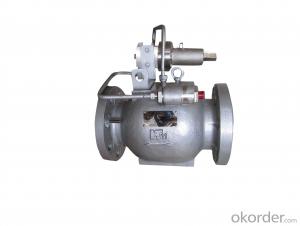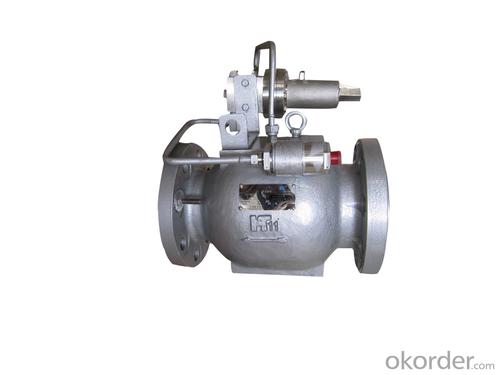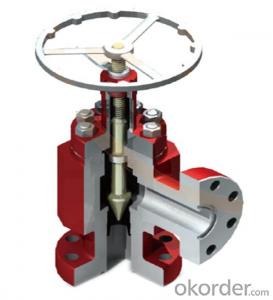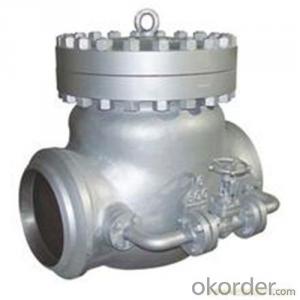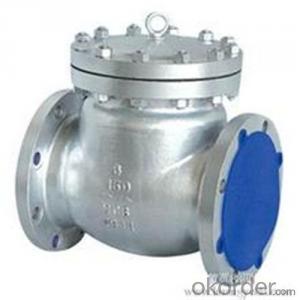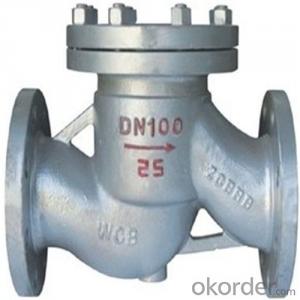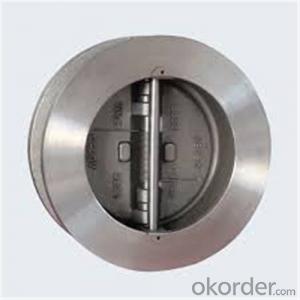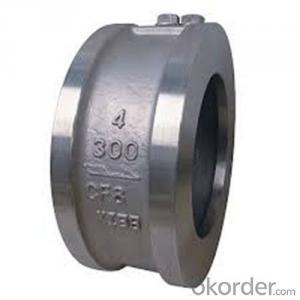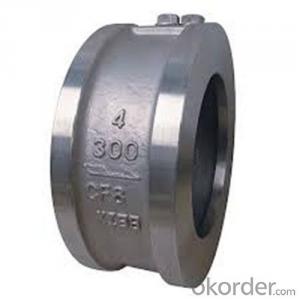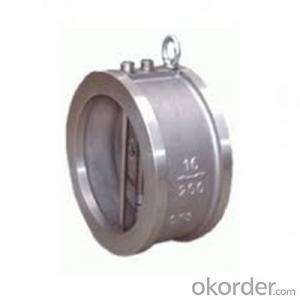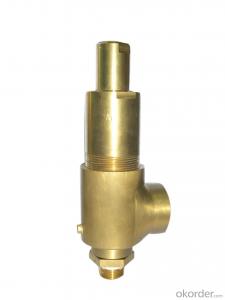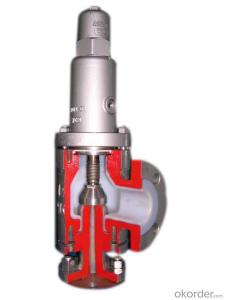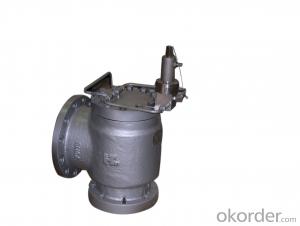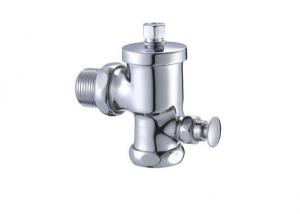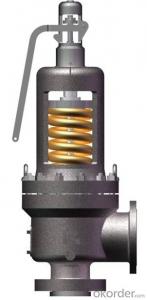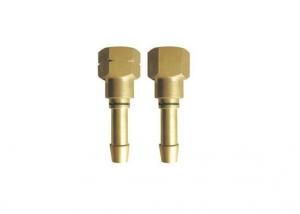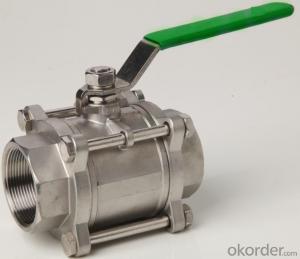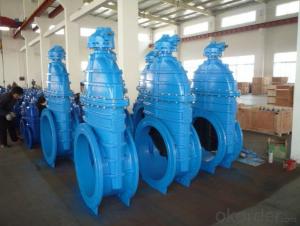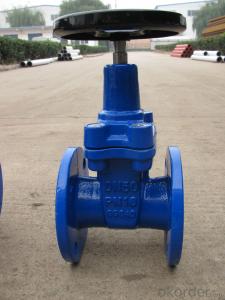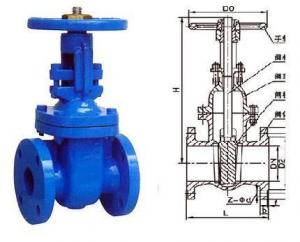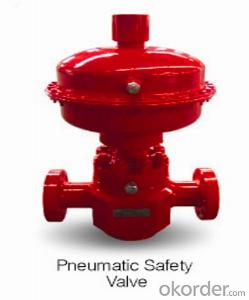High Performance Safty Valves
- Loading Port:
- China Main Port
- Payment Terms:
- TT OR LC
- Min Order Qty:
- -
- Supply Capability:
- -
OKorder Service Pledge
OKorder Financial Service
You Might Also Like
Application:
A pressure relief valve (PRV) is a safety device that relieves overpressure in a vessel or system. When the pressure of vessel or system increased beyond the specified design pressure or maximum allowable working pressure, PRV will be opened automaticly to relief the overpressure for proteding the vessel or system. The PRV will be closed if the pressure reached specified design pressure so that to ensure the normal operation and protect the vessel or system.
Our Pressure Relief Valve has been designed and manuractured according to following Standard:
♦ ISO 4123-1 Safety Devices for Portection Against Excessve Pressure
♦ API STD 526 Flanged Steel Pressure Relief Valves
♦ API STD 527 Seat Tightness of Pressure Relief Valves
♦ ASME Boiler and Pressure Vessel Code Section VIII Division 1, Rules for Construction of Pressure Vessels
Peformance:
♦ Type: Conventional, Bellows
♦ Size:1" D 2"- 8" T 10"
♦ Class:150lb~2500lb
♦ Temperature:-268~+538°C
♦ Fluid: Gas, Steam, and Liquid
♦ Material: Carbon steel, Stainless steel, Alloy steel
♦ The allowable tolerance of the set pressure: ≤±3%
♦ Overpressure: ≤10%(gas)/≤20%(liquid)
♦ Blowdown: ≤10%(gas)/≤20%(liquid)
♦ Tightness: conforms to API STD 527
Features:
♦The solid nozzle is screwed into the body, which makes the maintenance easy.
♦ The shape of the disc holder has been designed to enhance the effect of the fluid thrust for an instant lift of the disc.
♦ Blowdown control is provided with adjustable nuzzle ring only.
♦ The adequate terials and clearance between disc holder and guide , spindle and adjusting screw assures disc to lift successfully.
♦ The surface of both the disc and the nozzle seat are deposited with Stellite. Excellent flatness and surface finish of the seating surfaces by precision machining and lapping assure pressure relief valve to have high degree of seat tightness and long using life.
♦ The bellows of balanced bellows pressure relief valves can not only avoid and effect of variable back pressure in the system , but also protect spring and other trim components from corrosive media.
♦ Materials are chosen carefully , and the manufacture of the spring and the bellows has strict technological process. Each of them is tested and checked strictly.
- Q: my dad's friend died, and dad had been keeping some valves of his. now we've been left with about 400 valves and i'm going to sell them.my main question is what are they used for? i need to write a description for ebay but have no idea what they're for! anyone know?also, how much should i sell them for? on the box it says 11 shillings, which i worked out as ?1.32, but how much should i sell them for on ebay? there's prices on ebay that are about 50p to ?1.50 for most of them, but some are about ?7 but have no bids at all. how much should i start the bidding at?also, if you could give me any other information that i should put in the description, i would really appretiate it :)they are mainly 'Mullard' valves (the company name) but some are 'MAZDA'thanks! :D
- Valves (we call them 'tubes' here in the US, but 'valves' is actually a better description of how they work) were used on all kinds of electronics up to the 1970s. Radios and TVs mostly but also musical instrument amplifiers, PA system, etc.etc. In fact some high-end 'audiophiles' believe valves give you a better sound, so even today there are special (very expensive) amplifiers for both stereos and for guitars, that still use them. Only certain ones though, the ones that do final-stage amplification. And they still make the valves for these. People will want them for restoring old electronic gear, and to keep on the shelf in case one of theirs dies (they have a limited life). I have no idea what they're worth, but the answer to that question is: Whatever someone is willing to pay for them. So you have a few choices. Find shops that restore old electronics and call them and ask if they have anyone who would asses your valves, or even better, if they're interested in just buying the whole lot of them as a lot. Or go on EBay and look for the particular numbers and see what they've been selling for.
- Q: i was filling the tire on my car and the valve stem completely came out when i finished, quickly deflating the tire. i could push it back in but then the process repeated itself when i tried refilling it again. is there part of the stem i'm not seeing. the stem that i saw was long and straight and threaded. advise, thoughts? thanks.
- get a new valve stem. this one has gone bad. valve stems are very cheap. have someone at a tire store install it though.
- Q: Is it posible there is underground valves? I looked all over my yard and can only find2 valves.???
- Yes, electric valves are set on the Mainline which is under pressure. Usually in a loop around the home with the valves set where the zone starts. Some are designed to have a short mainline with the valves set in a large box next to a vacuum breaker. All valves need wires that run from the clock. Sorbet can be found with a metal detector if you simply can't find them. You can also set them to go off manually time delayed a few minutes, enough to go listen to hear the valve opening.
- Q: i just bought a junky trumpet, didnt come with a mouthpiece... how can i tell that the valves work? They press in and dont stick, but im not sure about their functioning. Also there are no caps on the valves, will this affect playing? lastly, it has a stuck tuning slide, how can i get this to work again?
- whilst i develop into in intense college, I performed on a 3C and had a particularly good sound. in my view, i could in no way visit a smaller, shallower mouthpiece to play intense. i could quite develop my chops and be waiting to do it on a deeper mouthpiece. In college, I switched to and nonetheless at present play a Monette B2, that's analogous length to a a million a million/4C, and characteristic an excellent sound, and might play a intense G (4 ledger lines above the staff) and up on it. i exploit it for any group I play in, marching, stay overall performance, musical theatre, etc... ultimately it boils all the way down to private preferrence. %. the mouthpiece that feels the terrific to you and nonetheless can provide a good sound. you do not pick it so great and deep that your variety and sound go through, and you do not pick is purely too small and shallow which you get too outstanding and tinny of a sound. wish this facilitates.
- Q: wife died at 40 still awaiting results of exsaminers report. Can CPR be given to some one with two artificial heart valves mitral and arotic? She the person administering CPR be aware that they are in the heart...
- Yes, and it doesn't matter if there are artificial valves or not. The thing about CPR is that it's only done for someone who is actively trying to die. The alternative to doing CPR is to let someone pass away, which is not usually the best course of action (unless they have a terminal disease and have asked not to be resuscitated.) If you are asking whether the presence of heart valves excuses someone from NOT doing CPR... then no. If you are asking whether heart valves + CPR and a bad outcome is because CPR should not have been done, then no to that too. The right thing to do for someone who is pulseless is to start CPR, call 911 and get more definitive treatment on the way. CPR is not going to revive someone - it is only a bridge until a defibrillator and/or cardiac drugs are available. I'm sorry that you lost your wife at such a young age, and I hope you find the answers you are looking for.
- Q: im 28yrs old with two babies.in my heart two valves are very tight and leaking too,im going for a transplanting them in august.If there is anybody who got this problem solved please share.Thanks in advance.
- Usually with an artificial valve, you'll need to be on a blood thinner for the rest of your life. If they use a natural valve, you usually won't need the blood thinner - perhaps you will for a little while, but not permanently. You can request a natural valve, but the surgeon doesn't know what size/shape of valve you need until he actually opens you up and sees what he's working with. He has an idea, based on the x-rays and MRIs you've had done, but he won't know for sure until he actually see it. So the surgeons are going to request that the Organ Procurement Department to thaw out two or three valves, depending on what they see in the tests. You can't just keep thawing out valaves, testing them, and then refreezing them if they aren't what you are looking for, so if they turn out to not be a good fit, he's going to turn to an artificial valve. So you could request a natural valve, but because of the shape of the gap that he needs to fill, you may have to have an artificial valve. Blood thinners scare people, and your friends will tell you horror stories about how their uncle's cousin's Nephew cut his arm and bled to death because he was on a blood thinner! That could happen, but it is very rare. What does happen is that you will have to go to your doctor once a month and have a blood test, and if your blood is too thin, you need to ease off on the blood thinning medication. Or if it is too thick, you need to take more. If you're blood is too thin, you'll bruise more easily - which might be embarrassing if the bruise can be seen. Blood thinners aren't as dangerous as they make them out to be, but they can be inconvenient!
- Q: My doctor detectd a heart mumer. I am 48 years old. Had a echocardiogram performed. He says that I have a sightly irregular valve and I do not need to take precautions. I run three miles a day. I have heard that this condition makes your heart more suceptiable to infection. You should take antibiotics when dental work is done. My GP is a man of few words. Just says continue as usual and nothing needs to be done unless there is further symptomns. My question: Should I follow up with a heart specialist or would it be over doing it? Should I go on antibiotics when I get dental work? Can this Slightely irregular valve get worse?
- kcharan - Unfortunately, you don't have enough information for anyone to give you an educated answer. The question of who should get antibiotics before dental work? is extremely controversial. Almost everyone would agree that someone with prosthetic valves, most kinds of congenital heart disease, a previous episode of endocarditis, and surgically created shunts/conduits should get antibiotics before dental procedures. Everything else is variable depending on whom you ask. The American Heart Association, the European Society of Cardiology, the British Cardiac Society, and the British Soceity of Antimicrobial Chemotherapy all have their own recommendations, and they are all different to some degree! To better answer your question, you need to find out which valve is abnormal, what your doctor means by slightly irregular, if there is any valvular regurgitation (leakiness) or stenosis (stiffness), and if so, how much. With this information, a cardiologist should be able to tell you how high your risk of endocarditis is and when, if ever, you should take antibiotic prophylaxis. They could also tell you if you have a condition that could get worse and whether it should be followed with regular echocardiograms. One thing I can tell you is that the research data to support antibiotics before dentalwork for people with minor valve problems (I don't mean the conditions mentioned earlier) is minimal and the actual risk is probably very low. Doctors used to make the recommendations based on educated guessing. But now, it is generally felt that taking antibiotics unnecessarily is NOT a case of it can't hurt. It can potentially cause dangerous allergic reactions or promote development of drug-resistant bacteria. In my opinion, it is never overdoing it to seek a second opinion from a specialist. As medical practitioners, we are here to do what is right for the patient. If it would give you peace of mind to speak to a cardiologist, then by all means do so!
- Q: Do most V6's have 24 valves? What are they for? (brief description would be fine)
- Like a bath plug with a stem attached or an ice cream cornet with a straight cone, and these go up and down in the head to let petrol in and exhaust fumes out. They're driven by a cam which has lobes on it which sit on top of the valves on the end of the stem as the cam goes round and round the valves open and close at the specific time to open and close the valves. Got it now? Ask at your local library for books on internal combustion engines then all will be revealed in text and pictorially. You could also go down to your local car or motorcycle breakers and buy or look at a cylinder head, which as engineer goes is a very simple system.
- Q: I am 31 and just discovered I have severe Mitral Valve Prolapse (Heart probelm). I probably have to have surgery. I have been healthy all my life and I am a little scared. Anyone had surgery for it? What can I expect??
- My mom did in may 2005. She was able to have it repaired, and she is doing great. It was painful for a few weeks, but shes good now.
- Q: Hey, ive got a scooby and have a baileys dump valve that is a loud deep wooooosh sorta sound. What dump valve does the more high pitch sound? also they dump valve with the higher pitch seems to need less presure ta dump, mine needs alot of pressure before it will dump loud?
- if i remember rite you can adjust the control settings for your dump valve so that it will dump at a lower pressure and a lower pressure dump should also give you the sound that you are looking for.
Send your message to us
High Performance Safty Valves
- Loading Port:
- China Main Port
- Payment Terms:
- TT OR LC
- Min Order Qty:
- -
- Supply Capability:
- -
OKorder Service Pledge
OKorder Financial Service
Similar products
Hot products
Hot Searches
Related keywords
